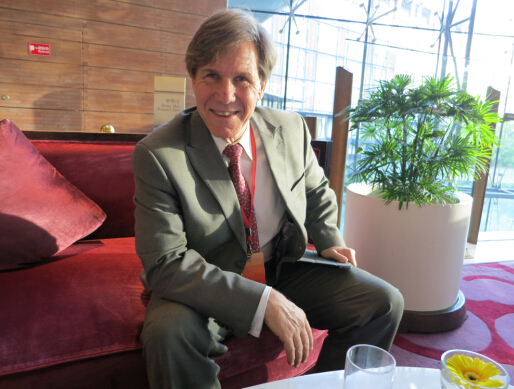
Randall R. Rader, Chief Judge of United States Court of Appeals for the Federal Circuit, is an old friend for Chinese IP community. In recent years, he has come to China to communicate and exchange ideas with the Chinese authorities and relevant organizations almost every year. Last summer, Judge Rader taught Foreign Patent Law which is a course on the international IP project at Tsinghua University. His course has attracted various people, among whom are students, lawyers from law firms and patent agencies as well as professors from other universities.
Judge Rader is not only the Chief Judge of United States Court of Appeals for the Federal Circuit, but also an influential in the U.S. and even all over the world. He was appointed in 1990 by President George H.W. Bush to a seat on the United States Court of Appeals for the Federal Circuit, and became Chief Judge of the Federal Circuit in 2010. While on the Federal Circuit, he has also served as a professor by teaching on patent law and other IP related knowledge in law schools of University of Virginia, George Washington University and Georgetown University, the Munich Intellectual Property Law Center as well as universities in Tokyo, Taipei, New Delhi, Beijing and other cities in the world. Meanwhile, he is the co-author of many books on IP laws, such as Cases and Materials on Patent Law and Patent Law in a Nutshell, both being the most common teaching materials on patent law in America. As an appeal judge, Rader has led and participated in over 60 delegations abroad and taught IP laws in developing countries. He combines the classic cases in America with the methods of storytelling and student surveying to make the lectures more interesting and practical by using his passion and unique personal charisma. Judge Rader is very willing to communicate with students, he would arrive at the classrooms half an hour or even an hour earlier to give enough time for opinion sharing with the students. He believes that China is the major driving force in the future development of patent laws and he is looking forward to conducting more communication and cooperation between China and America in aspects of IP law systems.
In October 2013, Zhou Qiang, President of Supreme People’s Court, met Judge Rader. Mr. Zhou said that China attached great importance to IP protection and encouraged innovation through legislation and jurisdiction. With the increasingly close economic communication between China and America, it was more significant for two countries to enforce the communication and cooperation in the field of IP judicial protection. And he hoped to build a mechanism and platform for information exchanging, experience sharing and talent cultivation as well as to promote the continuous judicial collaboration between the two sides. Judge Rader also expressed his willingness to making efforts to advance the communication and cooperation on the IP laws between the two countries.
China IP: Before your trip to China, it seems that there is some incomprehension in America. What is your opinion? Judge Rader: Although there are big differences between China and America, it is necessary for us to cooperate and learn from each other. Besides, I have visited China many times and have many friends here. I also used to teach patent laws in universities, from which I benefit a lot.
China IP: What is your opinion on the differences of the IP systems of the two countries?
Judge Rader: There are many differences in the ways the patent laws of the two countries are interpreted and enforced, but the basic principles are the same. The world is trying to solve several important issues. One is how to put the proper value on the IP; another is how to decide the proper way to deal with a patent, which uses a universally accepted standard applied by all manufactures in a particular field, which is one big difference between American law and Chinese law. In addition, America tends to give a much higher value to patents and copyrights than the Chinese system does. This is very important because it gives more incentives for people to invent if they acquire more value from it.
In terms of the IP judicial system in America, all the patent and copyright cases are tried in Federal District Courts. All the Federal District Courts send their patent cases to the Federal Circuit which handles all the patent cases on appeal within the America. Besides, the Federal Circuit also deals with all cases of business, tax and other kinds, but the most significant is on the patent cases.
China IP: Non-practicing Entity (NPE) has existed in America for quite a long time. What is the attitude of America to the NPE?
Judge Rader: It is certain that America doesn’t encourage NPE. NPE is a very complex issue. From the perspective of a judge, it doesn’t matter whether a patent owner has a manufacturing business or not. What matters is that the patent owners can invent and give new products to the world even if it doesn’t manufacture. Maybe the things researched are just in the experimentation stage, but it is also a very important contribution to society. Therefore, the NPE issue is quite difficult and hard to explain in a brief comment. For instance, all universities do not manufacture anything, but their inventions are vital to a nation in national policy making and in the way a nation develops new products in processes.
China IP: The IP system in America is considerably well developed, which results in numerous companies like Apple Inc. possessing many patents, while many Chinese companies are still in the developing stage. What do you think about the situation?
Judge Rader: It is not the case. I think there are plenty of important Chinese companies who are making important inventions. For instance, HUAWEI is a very influential international company that is making many significant inventions and improving the world’s technology. So are Lenovo and many other Chinese companies. Whatever the popularity of a company is, the key issue is how the company is doing to improve itself, its products and to make great contribu


tions to the social progress and development.
China IP: Have you ever dealt with cases involving Chinese parties? Could you share some thoughts for them?
Judge Rader: Yes, I have already dealt with a large number of cases involving Chinese companies. My advice for Chinese companies would be acquiring good patents because if they would improve their standing in the world market, it is urgent to make inventions and acquire IPR. China needs to become an innovation economy instead of a manufacturing economy. This is very common but very true advice.
Through communication for many years, Judge Rader believes that Chinese judges possess strong professional abilities and a profound understanding of the basic IP issues. And he hopes to further expand the sharing and cooperation between the two countries.



